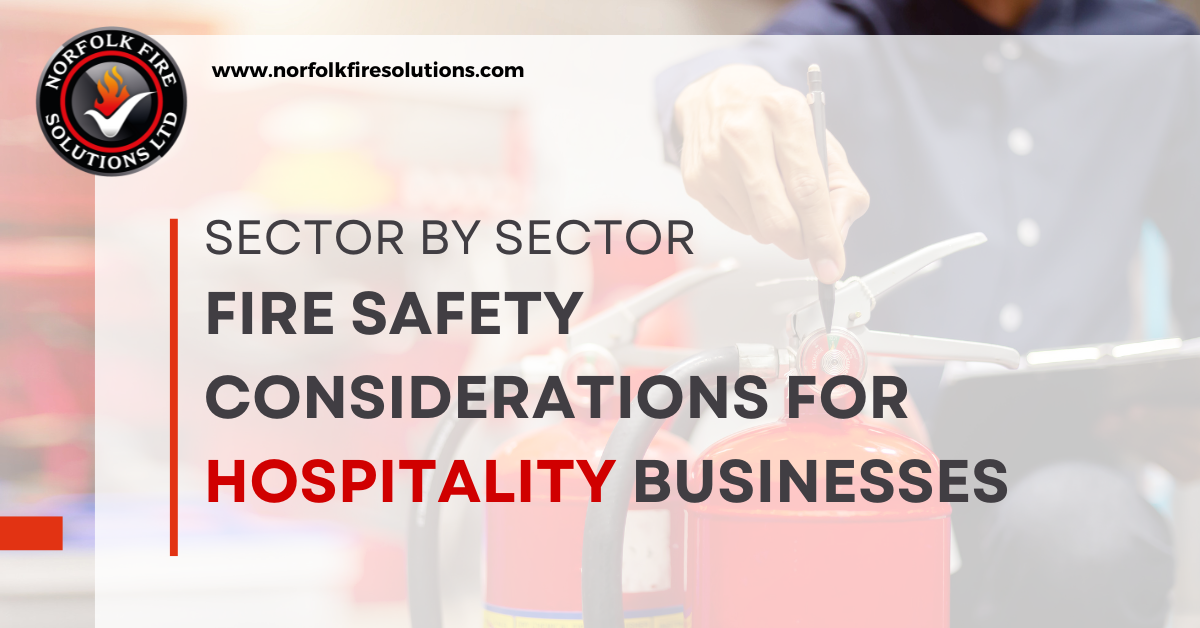Sector by Sector: Fire Safety Considerations for Hospitality Businesses
Sector by Sector: Fire Safety Considerations for Hospitality Businesses

Fire safety is a critical concern for hospitality businesses, including restaurants, pubs, hotels, and cafes. These establishments face unique risks due to the nature of their operations, high occupancy rates, and the presence of guests who may not be familiar with their surroundings. Ensuring compliance with fire safety regulations and implementing robust measures is not only a legal requirement but also essential for protecting lives and assets.
Key Fire Risks in Hospitality
- Kitchen Fires
Kitchens are at the heart of many hospitality businesses and are a common source of fire hazards. The combination of open flames, cooking oils, and high-temperature equipment significantly increases the risk of fire. - Overcrowding
During busy periods, such as weekends or special events, overcrowding can make evacuation more challenging and increase the likelihood of exits being blocked. - Flammable Furnishings and Decorations
Many establishments use materials such as upholstery, curtains, and festive decorations that can fuel a fire if they are not fire-resistant. - Electrical Hazards
The use of multiple electrical appliances, including heating systems, lighting, and entertainment equipment, can lead to overheating or faults if not properly maintained.
Fire Safety Measures for Hospitality Businesses
- Regular Maintenance of Kitchen Equipment
- Install and maintain kitchen-specific fire suppression systems.
- Clean extractors, vents, and hoods regularly to prevent grease buildup.
- Provide staff training on managing kitchen fires, including the correct use of fire blankets and extinguishers.
- Evacuation Planning
- Clearly mark emergency exits and ensure they remain unobstructed at all times.
- Conduct regular fire drills to familiarise staff with evacuation procedures.
- Provide guests with visible fire escape routes, especially in hotels where they may not know the layout.
- Fire-Resistant Furnishings
- Use fire-retardant materials for upholstery, curtains, and carpets.
- Check that decorative elements meet British fire safety standards.
- Limit the use of combustible decorations, particularly during festive seasons.
- Electrical Safety
- Perform regular Portable Appliance Testing (PAT) for all electrical equipment.
- Avoid overloading circuits and replace faulty appliances promptly.
- Ensure lighting systems, including emergency lighting, are well-maintained and fully operational.
- Staff Training
- Train employees on fire prevention, recognising hazards, and using extinguishers.
- Assign fire wardens to oversee evacuation in emergencies.
- Incorporate fire safety training as part of the onboarding process for new hires.
Legal Responsibilities
Hospitality businesses must comply with the Regulatory Reform (Fire Safety) Order 2005, which places responsibility on the ‘responsible person’ (typically the business owner or manager) to:
- Conduct and regularly review a fire risk assessment.
- Implement fire safety measures to reduce risks.
- Provide adequate fire safety training to staff.
Failure to meet these requirements can result in fines, legal action, or worse, loss of life.
Benefits of Strong Fire Safety Measures
- Protecting Lives: The safety of staff and guests should always be the top priority.
- Avoiding Legal and Financial Penalties: Compliance minimises the risk of fines or litigation.
- Preserving Reputation: A fire incident can damage a business’s reputation and lead to lost revenue.
- Minimising Property Damage: Effective fire safety reduces the impact of fire on premises and assets.
By addressing the unique fire risks in the hospitality sector and adopting industry-specific measures, businesses can create a safer environment for both employees and guests. If you need expert advice or support in developing your fire safety strategy, get in touch with our team today.
